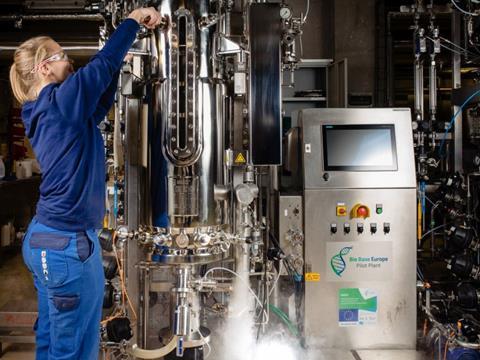
WASTE2FUNC has been granted a €6.7 million investment from the Bio Based Industries Consortium Joint Undertaking (BBI-JU) to build a platform to collect food waste with the aim of converting it into bioplastics and biosurfactants for applications including cosmetics, household, and personal care products.
The project says that food waste flows from agriculture, the food industry, retailers, auctions, and restaurants are discarded, left on the field, or incinerated if they do not meet standards, also meaning they cannot be sold and have little end use value. WASTE2FUNC will focus on these streams, which it claims creates unnecessary CO2 emissions.
Sofie Lodens, project coordinator of WASTE2FUNC, explains: “These emissions can be avoided by using these streams to convert them in to high-value products.
“TripleW, an Israeli/Belgian SME and Ghent University together with the Bio Base Europe Pilot Plant have developed technology to convert mixed batches of food waste into functional ingredients, more specific lactic acid and microbial biosurfactants respectively, that can be used for the production of bioplastics and personal- and home care applications.
“WASTE2FUNC will build a logistic platform to collect the agricultural and food waste and will demonstrate the conversion technology at large scale.”
This conversion process reportedly uses industrial bio-technology, bringing together 12 partners from five countries. This includes Inbio.be (the research laboratory of Ghent University), City University of Hong Kong, Triple W, Ecover, Boerenbond, Organic Waste Systems, Arche Consulting, Group Op de Beeck, Croda, Evonik, and NNFCC.
According to WASTE2FUNC, its platform will decrease CO2 emissions by at least 20% and increase value from waste by two- to ten-fold. In addition, the group says the scheme will create jobs for the primary and downstream sectors in Belgium and Europe.
The first challenge for the group will be establishing a logistics platform that allows for the efficient collection of food waste streams that currently have no end use. Therefore, the project says it will develop a registration website and app that can be used to identify food waste flows from the agriculture and food industries, for collection by a waste collector.
Boerenbond will apparently be involved with developing the registration app in collaboration with farmers, while Group Op de Beeck, a waste collector, will provide a feedstock stream and assist with the enrolment of the new logistic platform.
The project adds that farmers will be consulted on how to make the collection of food wastes worthwhile and what compensations should be given in return, potentially offering new revenue models. Further consultations will aim to establish the availability of these waste streams, involving both farmers and the wider food industry. Organic Waste Systems will look into the economic, environmental, and social assessment of the processes and technologies developed as part of the project.
As for production, Lodens says: “TripleW has already started their lactic acid production batches in their demonstration plant on the site of Group Op de Beeck in Kallo, Belgium.
“Ghent University and Bio Base Europe Pilot Plant recently established the spin-off company Amphi-star to bring their technology for the production of microbial biosurfactants to the market.”
The functional ingredients produced by the project will then be tested and evaluated for use in end products by Evonik, Croda and Ecover. Evonik and Croda will look into the application of waste-based microbial biosurfactants in their products, while Ecover will examine potential applications of both waste-based microbial biosurfactants and lactic acid in their products.
Croda recently announced a partnership with Xampla, which will involve it working on micro-plastic free, biodegradable seed coatings for the agricultural sector. Meanwhile, Ecover was a finalist in Packaging Europe’s 2020 Sustainability Awards for its 100% post-consumer recycled bottle body and 50% PCR content cap.
For the WASTE2FUNC project, Arche Consulting will consider waste regulations and aid with the registration of the products to help with market uptake.
The ultimate end goal of the project is to understand the potential of establishing a biorefinery in which functional molecules can be made from food waste collected in an economically sustainable way, with a focus on the optimisation of the biosurfactant fermentation and purification processes for scalability. The project intends for the functional molecules to act as “building blocks” for bioplastics and as ingredients in cosmetics, detergents, and other applications.
The project first launched in 2021. It is expected to come to an end in November 2024.














No comments yet